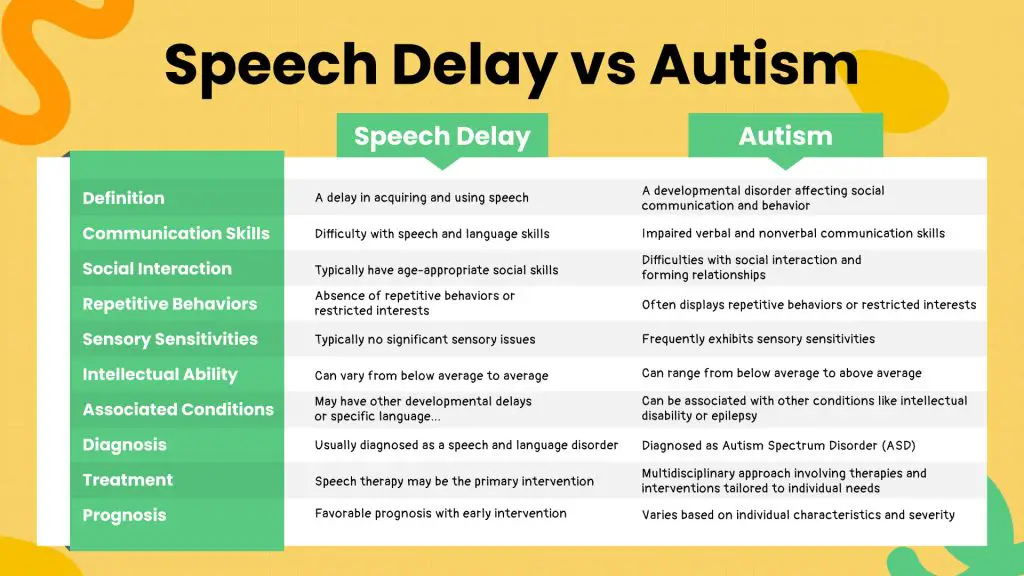Speech delays in early childhood development are a common occurrence and there is no need to panic if your child is experiencing one. However, there are differences between your child being a late talker and experiencing a speech delay caused by autism. Being aware of these differences in speech delay vs. autism can help you set your child on the right track.
The differences between the two forms of speech delay can often be observed even by untrained eyes. Every toddler learns to speak at his or her own pace and many are simply late bloomers, but it’s important for you as a parent to know what to look for so you can communicate early and thoroughly with your pediatrician, seek an evaluation if necessary, and get your child the resources to help him or her thrive.
So how can you tell if what your child is facing is a typical toddler speech delay vs. autism?

Delayed Speech in Toddlers Due to Autism
Before he even utters his first word, your toddler is already exhibiting communication skills. Typically, children will start with pulling, cooing, or eye contact as their first method of making themselves heard. Since these forms of communication work so well for them, they eventually graduate to using words to do the same; after all, they seem to get better results this way.
Of course, there are other reasons that your child will eventually begin to incorporate words in her interactions. One of the biggest is the imitation factor. Most children follow the idea of “monkey see, monkey do” and that includes speaking.
Social interactions are another reason toddlers begin to speak more. This is a vital time for their social development so they are all about getting positive reinforcement in whatever fashion they can get. But with an autistic child, this is not always the case.
Autistic children tend to exhibit antisocial behavior which impairs their development of language skills. This depends on where the child lands on the spectrum; high-functioning autistic children will be more social than others, though the signs of autistic speech delay are the same nonetheless.
Autistic children are not typically motivated by the same social cues and responses. They are often more driven by things they are into. Things can be more important to them than people, making them less likely to emulate their peers.
Paying attention to your child’s behaviors can help you determine that an autism spectrum disorder may be the cause of your toddler’s speech delay.

Signs of Speech Delay Caused by Autism
Late speech is a problem but could be caused by many things. However, there are other communication-based problems that could help you determine if your child may be autistic. Some of these other signs of autism may include:
Verbal Skill Issues
- A child has echolalia, which is the unsolicited repetition of select words or phrases.
- A child only uses baby sounds to communicate, indicating a lack of social response and acclimation to peers.
- A child uses character voices like a pirate or robot to communicate everything.
- “One and done,” when a child uses a word once and then never again, even if it would help him.
Response Issues
- A child has difficulties following simple verbal and non-verbal instructions.
- A child is unresponsive to her name or simply ignores it when someone talks to them
Communicative Issues
- A child does not make eye contact with his desired object
- A child does not make nonverbal gestures, such as pointing or nodding
- A child exhibits a lack of understanding when it comes to facial or body cues commonly used.
- Imitation of these same nonverbal cues is difficult or nonexistent.
- A child wants you to serve as her go-between, in other words, to do something she could have easily done herself.
- A child communicates attention to something by simply looking from it to you repeatedly.
Though these signs are distinct, they are by no means are a conclusive diagnosis of autism. If your child exhibits some or all of these, the first thing you should do is consult your pediatrician. Your doctor can further evaluate your child and, depending on the diagnosis, help set you and your child up with the best resources to help him or her.
Final Words
Determining whether a child has a speech delay vs. autism diagnosis can be tricky. Speech delays, whether caused by autism or not, can lead to communication issues in the future. Children with speech delays can have issues with things like unique vocal patterns, reading, or understanding non-verbal cues.
However, as we’ve said, speech delays are not a definite indication that a child has autism and if you’re concerned, you should have your child evaluated as soon as possible so you can know what should be done. Knowing the cause of a speech delay disorder in toddlers will help you ensure your child is receiving the right therapies to help her best communicate as she grows.

